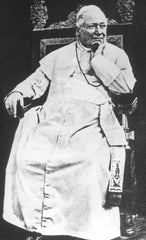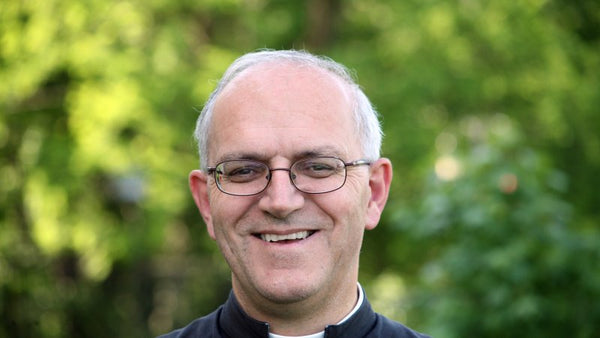Understanding the Crisis: Archbishop Lefebvre and Religious Liberty
In this second part of our series, Understanding the Crisis, we will examine the question of Religious Liberty and the response of Archbishop Lefebvre to this question specifically as found in his interventions at the Second Vatican Council, from the book I Accuse the Council.
This question, in light of the ever-increasing hand of governments, of open persecution throughout the world, and in light of the ingrained response of those of us living in the modern world, is a truly urgent and important one.
In light of this, it is not surprising that the position of Archbishop Lefebvre and the Society of St. Pius X (among others) against religious liberty is one of the most contentious, and also unsurprisingly, one of the most misunderstood. To get to the root of this question, let’s examine briefly the interventions he made concerning this teaching.
Commenting on these interventions at a later date, he says,
It should be noted that this theme formed the subject of a dramatic debate at the last session of the Council’s preliminary Central Commission. [Note: Archbishop Lefebvre was a participating member of that Commission.] In fact, two schemas on the same theme were drawn up: one by the Secretariat for Unity directed by Cardinal Bea, the other by the Theological Commission presided over by Cardinal Ottaviani. The title of the schemas alone is significant: the first was De Libertate Religiosa, which is the expression of the liberal thesis; the second De Toleratione Religiosa, merely echoes the traditional teaching of the Church.
 Already, before the Council even begins, there is a tension, which, as the Archbishop points out, can be seen in the titles: On Religious Liberty vs. On Religious Toleration. To the modern mind, we may not notice much of a difference, but the most important part of this debate, especially as it relates to the modern world is found in this difference. When I say something has liberty in some aspect, I am referring to a right it possesses. When I say something is tolerated, I am explicitly saying that it is not ideal, that is it not even good (in itself), but that some greater good demands that in prudence, the evil be tolerated. Keep this in mind as we continue this short look.
Already, before the Council even begins, there is a tension, which, as the Archbishop points out, can be seen in the titles: On Religious Liberty vs. On Religious Toleration. To the modern mind, we may not notice much of a difference, but the most important part of this debate, especially as it relates to the modern world is found in this difference. When I say something has liberty in some aspect, I am referring to a right it possesses. When I say something is tolerated, I am explicitly saying that it is not ideal, that is it not even good (in itself), but that some greater good demands that in prudence, the evil be tolerated. Keep this in mind as we continue this short look.
Concerning the schema on Ecumenism, Archbishop Lefebvre directs his actions against a false notion of the dignity of man. He says, in an intervention to the Decree on Ecumenism, and here we quote from him at length,
Venerable Brethren,
All the arguments of Chapter 5 on the subject of ‘religious liberty’ are based on the assertion of the ‘dignity of the human person.’ It is said, in fact, on page 4, para.3:
Thus the man who sincerely obeys his conscience intends to obey God Himself, even though sometimes in a confused way and without knowing it, and that man must be judged worthy of respect.’
My pure and simple reply to accepting such a statement as it stands is no. Considering the matter more closely, a distinction must be made: In view of his intention to obey God, yes; in view of his confusion, no.
From where, in fact, does the person derive his dignity? He draws his dignity from his perfection. Noiw the perfection of the human person consists in the knowledge of the Truth and the acquisisition of the Good. This is the beginning of eternal life, and eternal life is ‘that they may know Thee, the only true God, and Jesus Christ whom Thou hast sent’ (Jn. 17:3). Consequently, so long as he clings to error, the human person falls short of his dignity.
Let’s unpack this statement briefly. Thankfully, it’s clear and direct, so not much is needed, but it’s helpful to review. First we have the text in question stating that man has an inherent dignity and so when he follows his conscience (with no qualifications given) he is, knowingly or otherwise, intending to obey God. But since this question rests upon a question of conscience, the Archbishop takes up the sword for traditional doctrine: When a man is following an informed conscience (even if he errs), then we may say he is intending to follow God. But when a man is following an unformed conscience, and so is acting in, at least partially, a remediable, but erroneous conscience, Archbishop Lefebvre says “no.” In that aspect, considering the latter statement, he is not worthy of respect (in this sense).
From there, the Archbishop moves to undermine a notion, the defense of which, has resulted in much ink and many felled trees: That man’s dignity derives, somehow, from himself. Countering this truly hideous modern notion, Archbishop Lefebvre points out that it is only in our perfection, that is, in fulfilling the role and purpose given us by God, that we may speak of human dignity. As such, it is only a relative dignity. That is to say that man only derives his dignity from the end given him by God; seeing things in this light, it is impossible to conclude that the dignity of man can be met or respected by going against the purpose God established for man.
Continuing with the Archbishop, he points out that the text in question states, “The Catholic Church claims, as a right of the human person, that no one be prevented from carrying out and proclaiming his public and private duties towards God and man…according to the light of his conscience even if it is in error.”
How does Archbishop Lefebvre counter this? By an appeal to natural and supernatural law, and to the constant teachings of the Church. In a short statement that goes right to the point, he states,
God founded the family, civil society, and above all the Church, in order that all men might recognize the truth, be forewarned against error, attain to good, be preserved from scandals and thus reach temporal and eternal happiness.
There is the plan. If we know from the above statement of the Archbishop that man only achieves his dignity, and is consequently, only “worthy of respect” by corresponding to God’s plan for him, then here we see the plan: to recognize truth, avoid error, attain good, be preserved from scandal, and thus, reach eternal (and temporal) happiness.
It is evident that the attempt to teach that man, even with an erroneous conscience, has a right, “as a human person,” such that “no one be prevented from carrying out and proclaiming his public and private duties towards God and man,” cannot coincide with the traditional doctrine as laid out by Archbishop Lefebvre.

We will continue this study of the Archbishop’s interventions in a later post, having now just scratched the surface; but for now, let us close, as Archbishop Lefebvre himself did, with a quote from Pope Pius IX in his encyclical Quanta Cura, where the holy pope is condemning the teaching of those in his own age who were agitating for religious liberty:
Contrary to the teaching of the Holy Scriptures, of the Church, and of the Fathers, they do not hesitate to claim that: “the best condition of society is that in which it is not recognized that authority has the power to repress by legal penalties those who break Catholic law, except as far as public peace demands.
Note: Please also note, that the question of the relationship between Church and State, particularly regarding religious liberty, is the subject of the January/February 2013 issue of The Angelus.
Leave a comment
Comments will be approved before showing up.
Also in Angelus Press Blog

Angelus Press Website Update is Complete

Angelus Press Website Updates for Wholesale Accounts

Fr. Dominique Bourmaud Passes Away
With great sadness, the U.S. District of the Society of Saint Pius X (SSPX) announces the passing of Fr. Dominique Bourmaud. He went to his eternal reward in the early hours of Saturday, September 4, 2021.
Eternal rest grant unto Fr. Dominique Bourmaud, O Lord, and let perpetual light shine upon him. May he rest in peace. Amen.

Brent Klaske
Author
Director of Operations at Angelus Press. I have worked in Catholic publishing for more than 20 years. I currently live near St. Marys, KS with my wife and 10 children.